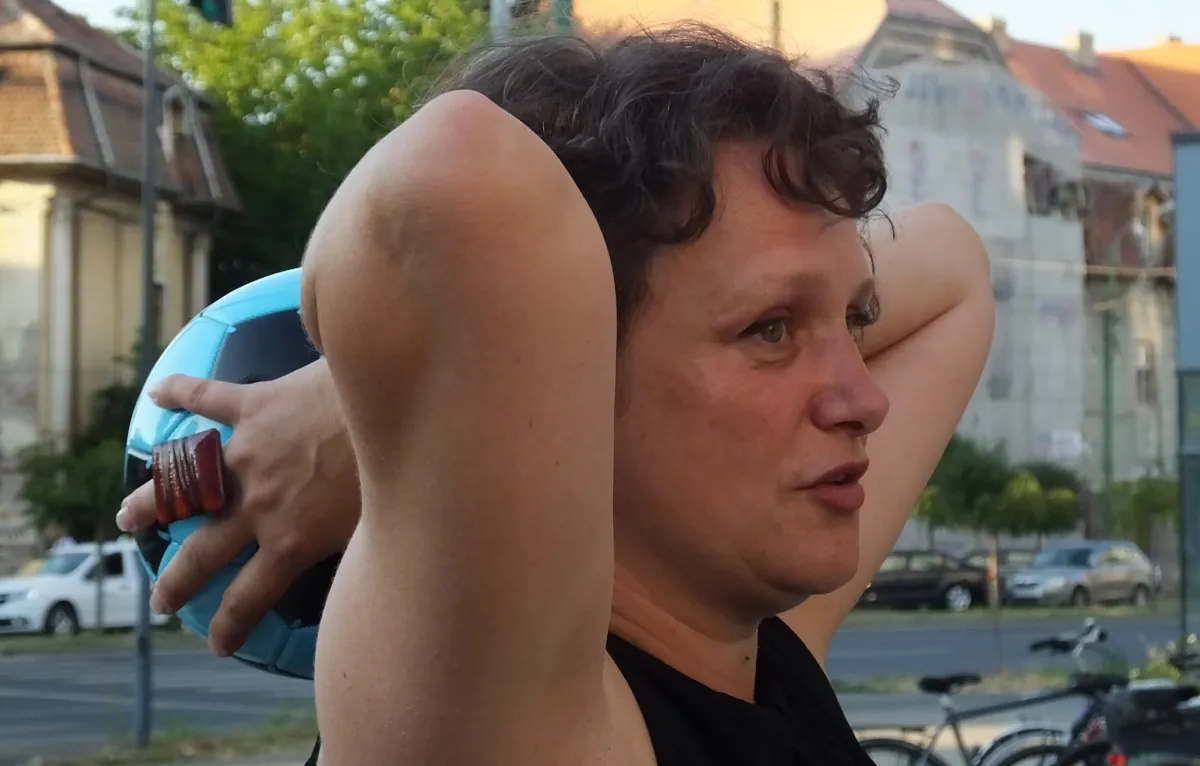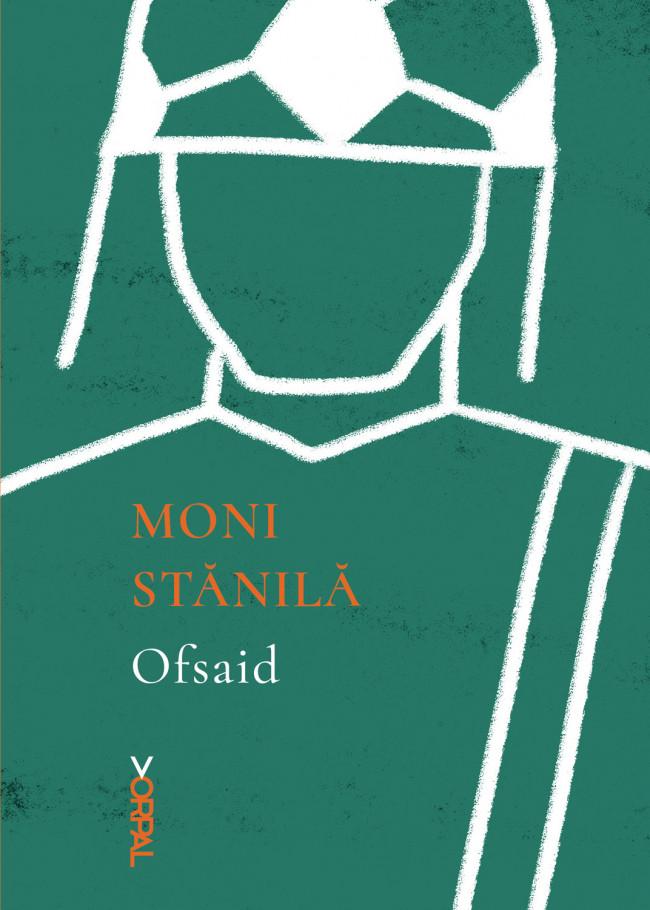If you fail, don't despair: blame the weather and the referee!

Born in 1978 in western Romania, Moni Stănilă is a versatile writer. After studying Orthodox theology, she has distinguished herself as a poet and author of children's books and novels. In 2019, she also published a literary biography about the Romanian-French sculptor Constantin Brâncuși. She was recently awarded the "Radio România Cultural" prize in the poetry category and the prestigious "Observator Cultural" prize for her latest poetry collection "Ofsaid", published by "Nemira" in Bucharest in 2022.
Suppose that, due to global climate change, it hailed more frequently over the plum trees on the hill in my village and my father could only make the famous Romanian fruit brandy pălincă every four years: that's how long we have to wait between parliamentary elections or the football championships. The weather has also been a hot topic when discussing the state of the stadiums in Germany, the Euro 2024 hosts . But I think we should worry about the schnapps rather than German stadiums. Because German quality is legendary, even when the weather doesn't play ball or referees make mistakes.
After all, the most formidable element in football is ultimately the referee, like the literary critic in literature. In other words: he never plays nor does he ever lose. It's easier to see poetry where there is none, than to write it; and it's much easier to spot a foul when Neymar or Messi throw themselves into the fray on the pitch, than to score a goal. But since Neymar and Messi are not European, the referees may do a little better than the literary critics this year. Although in Europe we do have teams that are loved equally by fans and referees.
It's true that, per square metre, there are countless Spanish or Italian supporters not only in the countries that don't make it past the group stage but also among the referees. However, we are used to Germany doing well at the World Cup and the Euros. Well, that didn't happen in Russia, but I think that outcome was even better. I'm glad the Romanian team didn't make it to Russia anyway. It's where you'd want to leave from as quickly as Germany did. Unless you're Croatia and have a player like Domagoj Vida, who is likeable and crazy enough to sing "Slava Ukrajini" ("Glory to Ukraine") after the matches, beer in hand, because only the Dynamo Kiev players knew perfectly well that the war had already started in 2014.
 Nemira
NemiraMoni Stănilă | Ofsaid | Nemira | 155 pages | 39.99 LEI
But let's talk about the World Cup in Qatar, already a distant memory, and again question whether Japan's second goal was an actual goal or one given by the referee. Because VAR only does one thing: it annoys us even more. How do you decide from which angle to show us the replay (if at all!). At least there was one great thing about the 2022 World Cup - Argentina won. Apart from that: 1000 controversies and a totally inappropriate month for beer. What kind of championship is this? - In winter! Nobody likes that. But what we do like is that there's no VAR for writers. So sometimes a good book makes it to the final without a kick-off, even in winter - with Pălincă instead of beer.
It could actually have been January 1 for the 2014 final in Brazil - cold and stormy, I didn't leave the house, didn't buy beer and didn't eat anything so as not to upset my stomach. Just a few days earlier, out in the village with lots of friends and in a good mood, I had cheered every ten minutes as Germany scored against Brazil. I was the only German fan in a sea of experts trying to explain to me Brazil's superiority, innate talent, the chicken-and-egg theory, the formation and decay of galaxies, the Big Bang and many other things irrelevant to that day. And here's my main point: Brazil that year was like a mediocre writer who is praised by literary critics, awarded prizes and presented at international festivals, until one day he finds himself at a public reading with a brilliant writer. Once the public passes judgment, literary criticism can no longer save the situation. But back to the game: I admit that I didn't expect so many goals either, and I'm sure Colombia would have done better in the semi-final with James Rodríguez than Brazil with the referees.
The good thing about literature is that, no matter who I like, I won't get beaten up in the street for it. Maybe a fiction writer friend of mine will never speak to me again if I say publicly that Faulkner is better than Salinger, but I'm not risking my neck. Another advantage in literature is that we have no international policy saying that whatever the literary critic does, everyone else has to give them credit. No, we're better than that. We only agree with a critic if they praise us. Football is trickier - you can't criticise the referees. You can't question how FIFA was able to organize a World Cup in Russia and then one in Qatar immediately afterwards. It should be said that there are no political or financial interests in FIFA and no influential referees. We have just seen that the referees are right even if the ball goes out and they don't blow the whistle. Even then, they can't be brought down. Fights only happen among the supporters.
Poem of the month: 34. We lived well for a while
I've only twice come close to getting beaten up because of football. The first was at Euro 2016, when Germany beat Italy on penalties. What a day! I was on a terrace in Arad (Romania), on the banks of the river Mureș, where hundreds of fans were watching the match. We were sitting at a table with about twenty people, half of whom had no idea about football but were rooting for Germany on account of my enthusiasm; the other half included a covert Italy fan. The reaction after the last kick sent us fleeing. All the other fans were furious. The second time was 2018 in Chisinau (Moldova), in a bar full of Russia supporters during a match between Russia and Croatia. We didn't let on that we were supporting Croatia until the 101st minute. What yelling! What a risk! What a poem I wrote afterwards!
And that's exactly what I want from Euro 2024: lots of poetry and honest referees. The rest will fall into place. My country is now back in the arena of world football. Not to mention my joy after the group draw: I was as ecstatic as if I were on the shortlist for a major literary prize. Belgium, go for it. In second place we'd have Romania, Slovakia and a team from the play-offs. In short, I could imagine Romania on the podium! The thing is, I can't even blame the referees now. How on earth did Ukraine end up in the group with Romania? I would have preferred something different. But what can I do? On June 14, we'll see Germany's first win, and on June 17, I'll be by the sea watching the match between Romania and Ukraine (I'll post a photo!).
Germany, on the other hand, should only come through the group stage with wins. However, there are teams that are capable of springing surprises. Ever since Bob Dylan won the Nobel Prize for Literature, I think all scenarios are possible at the Euros (assuming the referees don't play along). This is by no means to say that Bob Dylan is not a poet or that Spain is clueless about football. However, I would also bet on goals from Bellingham or Kane. As for the friendly between Germany and Ukraine, let's not despair. Germany are the only team that knows that friendlies really are friendlies; even Romania celebrated a historic 5-1 win over Germany in 2004. The results of the last few years have no bearing on the Euro results. Because despite the modest performances in recent years, it's time for Manuel Neuer to take home a European Championship goal (and the trophy!), and as far as I'm concerned, it's time for Romania to get through the group stage with at least two goals from Hagi. And if neither happens, I'll blame the referees, as usual, and say that the literary critics have once again awarded the Nobel Prize to a great singer, while great poets wait, as yet untranslated, for the weather to stop ruining the Romanian plums.



